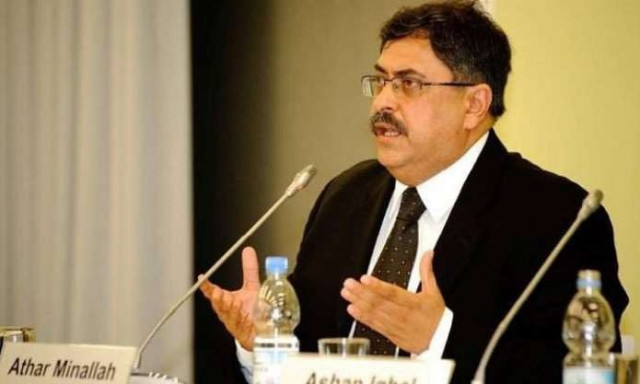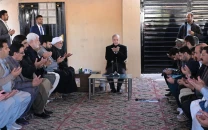Justice Minallah puts ball in state’s court
Says buck stops with executive, state to satisfy there has been no interference

Supreme Court Justice Athar Minallah has said that the buck stops with the state and the executive to demonstrably satisfy the full court that there has been no interference in judicial functions.
He threw shade on longstanding “unacceptable practices and norms” within the judiciary, spanning over seventy-six years, that have been made acceptable.
In the defence of the IHC judges' letter, Justice Minallah stressed the credibility and truthfulness inherent in their oaths to uphold the Constitution. He asserted that their concerns should be given weight unless proven otherwise.
He asserted in a five-page note in which he disagreed with the initial sections of the main order penned by Chief Justice of Pakistan (CJP) Qazi Faez Isa in the suo motu case concerning the IHC judges' letter.
The jurist’s note came in the wake of the apex court’s decision to seek proposals from all stakeholders, including the federal government, high courts and two superior bars, on the institutional response and mechanism to address the issue.
“The judges have highlighted the institutional insensitivity. The attorney general has referred to political engineering in specific politically consequential matters in the past while it appears from the letter of the six judges that it continues unabated even today,” the note read.
The impunity against intimidation of the judges and interference in judicial proceedings in politically consequential matters cannot be denied, rather it has been affirmed by this court repeatedly, it added.
Defending the IHC judges’ letter, Justice Minallah said that the six judges of the IHC have sworn oaths under the constitution and, therefore, a presumption of credibility and truth is attached to what they have highlighted in the letter unless it is rebutted.
Also read: Justice Minallah wades into suo motu row
"They have done what every judge is bound by the oath to do; uphold the Constitution and the independence of the judiciary. There is no conceivable justification to doubt their intention in bringing on record a matter of the highest public importance.”
He pointed out that it has been noted that the letter was in the nature of an internal institutional correspondence and it was not meant to be made public.
The jurist further emphasised that the judges had reasonable grounds to seek guidance and that is what they had explicitly sought. “They had blown a whistle internally and as whistleblowers, they were required to be dealt with carefully because the whistle-blowing was in the public interest.”
He stressed that the SC in the present proceedings also has to consider evolving jurisprudence which does not deter internal whistle-blowing because of the public importance associated with it.
"No one within the institution must fear that blowing the whistle internally could lead to unimaginable consequences having the effect of being thrown to the wolves. Such an approach would profoundly undermine the internal independence of the judiciary,” the note read.
"It was, in my opinion, premature for the executive to constitute a commission and, prima facie, in breach of the independence of judiciary. The matter is now subjudice before the full Court. The full Court will consider whether an inquiry is required and, if so, the nature of the inquiry is also likely to be determined on the judicial side having regard to safeguarding the independence of judiciary,” Justice Minallah said.
SC judge said that the six IHC judges were not complainants but they had solicited advice and guidance.
Read: Minallah acknowledges SC’s democracy derailment role
Justice Minallah highlighted that the letter of six judges confirmed that the cases of Asghar Khan and Dhama could not stop interference in judicial proceedings and that the judgments were being brazenly violated.
‘Normalisation of deviancy culture’
Justice Minallah also lamented that the letter manifests the phenomena, “of normalisation of deviancy culture within the institution and outside which has profound consequences for the independence of the judiciary”.
He bemoaned that no one has ever been held accountable, which has created impunity for the worst form of mutilation of the independence of the judiciary. The public trust in the judicial system is eroded when the courts are perceived to be compromised.
"The flagrant violations of fundamental rights of the citizens and perceived failure of the courts to safeguard individual freedoms and rights severely undermines public confidence in the institution. The citizens would, therefore, be justified in raising questions regarding the independence of judiciary.”
He stressed that, “As judges of the highest constitutional court, we cannot turn a blind eye and ignore the grave abuse of powers by the executive which have consequences for individual freedoms and rights.”
"We all know the reality but pretend to be ignorant. The six judges have raised the crucial question of 'whether there exists a continuing policy on the part of the executive branch of the State, implemented by intelligence operatives who report to the executive branch, to intimidate judges, under threat of coercion or blackmail, to engineer judicial outcome in politically consequential matters'.”
"The other crucial question that has arisen from the letter, as already discussed, is regarding normalisation of the culture of deviancy. Both these critical questions erode and undermine the independence of judiciary. The onus is on the Federal Government to establish before this Court that it is not so and to assist in resolving the questions raised in the order,” Justice Minallah said in his order.
Justice Minallah has said that it is obvious from the letter that they had raised the issue before all the relevant forums but, despite the seriousness of the matter, there was no institutional response.
"The matter was also promptly brought to the attention of the former Chief Justice of Pakistan, who at that time had the exclusive power to invoke suo motu proceedings under Article 184 (3) of the Constitution.”
"The matter was serious and its implications in the context of the independence of judiciary were so grave that there could not have been any conceivable justification for the then pater familias of the institution to ignore it insensitivity is manifest from the letter.”
He noted that it also reflects a culture of accepting the 'practice of manipulation of judicial proceedings by the executive branch of the state through interference and intimidation.
"The institutional response relating to the most serious and grave acts of interference in judicial proceedings and intimidation of judges could be an acceptance of practices, standards and norms which have profound consequences for the independence of the judiciary.”
"The letter by the six judges, therefore raises questions regarding the institutional commitment to uphold the Constitution and the independence of the judiciary. The interference and intimidation, as reported in the letter, is in relation to certain 'politically consequential matters' and, 'in support, instances have been described in the letter"
SC seeks proposals
Meanwhile, a seven-judge larger bench, headed by CJP Isa, has released a written decree, soliciting suggestions from various stakeholders, including the federal government, high courts, and two prominent bars—the Pakistan Bar Council (PBC) and the Supreme Court Bar Association (SCBA).
The directive aims to gather input on how best to formulate an institutional response and mechanism to tackle issues similar to those outlined in the letter penned by six judges of the IHC.
In a six-page written order authored by CJP Isa, he stated, "In their letter, the IHC judges have mainly requested to undertake 'institutional consultation' in the background of the issues raised by them 'to consider how best to protect the independence of the judiciary' and to 'put in place a mechanism to affix liability for those who undermine such independence and clarity for the benefit of individual judges the course they must take when they find themselves at the receiving end of interference and/or intimidation by members of the executive'."
“We are, therefore, of the view that it would be an appropriate starting point, in the present proceedings, to call for proposals from the main stakeholders in the judicial system and the independence of the judiciary, i.e., (i) the Pakistan Bar Council, (ii) the Supreme Court Bar Association, (iii) the High Courts, and (iv) the Federal Government as to what should be the institutional response and mechanism to address the issues like the ones raised in the letter and ensure that such issues do not arise in future and if they do, to fix liability and proceed against those responsible. In any such process, the idea is to empower the high courts and their respective Chief Justices to deal with issues relating to the Hon’ble Judges of the High Courts or the District Judiciary. We expect that the proposals shall be made after proper consultation within the respective bodies and be filed by 25 April 2024".
Justice Afridi recuses to hear suo motu case
However, Justice Yahya Afridi has recused to hear the suo motu case.
Justice Afridi in his separate note said that no one can doubt the bone fide of invoking the suo motu jurisdiction under Article 184(3) of the Constitution.
However, when the letter of the six worthy judges of the IHC craves to formulate the administrative course of conduct for serving judges to not only address any intrusion of the executive in their judicial functions but more importantly, their mode and manner of interaction with the executive, to judicially proceed in the present proceedings would surely lead to an adverse spectacle - a sight he said he seriously urges should be avoided.
Justice Yahya Afridi said that one must also not ignore that the high courts under the Constitution administrative functions, but also provide security to and safeguard judicial the matter is already in the field.
"The inaction on the part of the Chief Justice or the Judges of the High Court not to exercise the jurisdiction and powers vested in him or them, should not lead this Court to super-impose the exercise of its jurisdiction under Article 184(3) of the Constitution. This may affect the functioning of the worthy Chief Justices and worthy Judges of the High Courts, and would to my mind amount to interference in the independence of the High Courts," Justice Afridi said.
SC judge further noted that none can dispute that the anxiety of the six worthy Judges of the Islamabad High Court raised in their letter dated March 25 addressed to the Supreme Judicial Council, most certainly warrants positive consideration, inter alia, for inserting appropriate provisions to regulate the interaction of judges with the executive and the remedial response of the judiciary to any attempt or actual interference in its judicial functions in the Code of Conduct of Judges of the superior judiciary, as provided under Article 209(8) of the Constitution.



















COMMENTS
Comments are moderated and generally will be posted if they are on-topic and not abusive.
For more information, please see our Comments FAQ